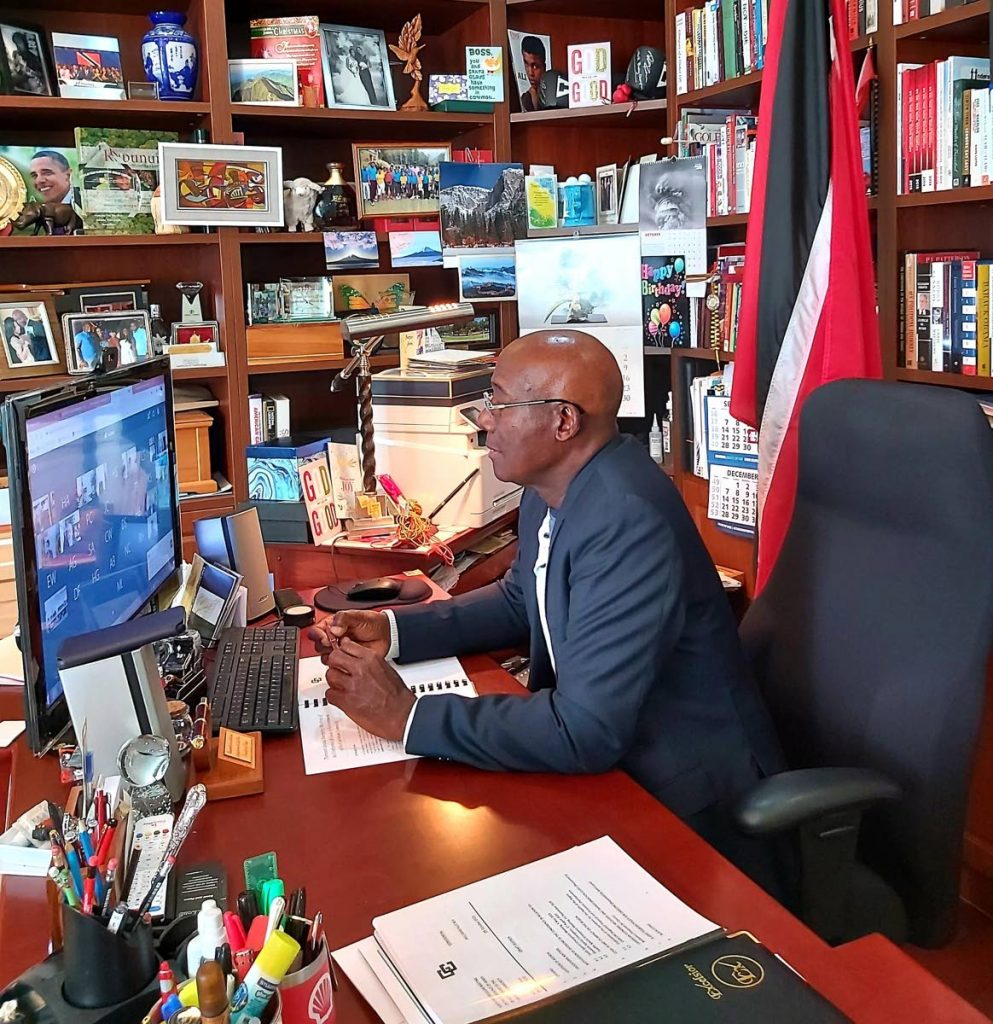Caricom knocks Venezuela over Guyana dispute

UNDER the chairmanship of the Prime Minister, Caricom on Tuesday criticised the Venezuelan government’s recent claim to two-thirds of Guyana, a Caricom member State, including offshore and oil-rich areas.
Following an angioplasty over the weekend, Dr Rowley chaired his first meeting as new chairman, held virtually, after which Caricom issued a statement on the border issue.
“The Caribbean Community (Caricom) is deeply disappointed and concerned at the decree and subsequent statements by Venezuela with respect to that country’s border controversy with Guyana, including intimations of the creation of a strategic area of national development called ‘Territory for the Development of the Atlantic Façade.’”
Caricom said it was in full support of the judicial process under way at the International Court of Justice (ICJ) to bring a peaceful and definitive end to the long-standing row.
“Caricom reiterates in the strongest possible terms its firm and unswerving support for the maintenance and preservation of the sovereignty and territorial integrity of Guyana.
"Caricom firmly repudiates any acts of aggression by Venezuela against Guyana.”
Minister of Foreign and Caricom Affairs Dr Amery Browne told Newsday that Rowley, as chair of this special emergency meeting of Caricom heads, had led the drafting and finalisation of the statement as one of his first official functions as the current chairman of Caricom.
“It is a strong and very timely statement of solidarity, which is fully consistent with the established Caricom position on how the referenced border dispute should be properly treated and resolved at the ICJ.”
In December, the ICJ said it could rule on the border dispute, as sought by the UN, but Venezuela at once rejected this in favour of "friendly negotiations to reach a mutually satisfactory settlement."
Last Thursday Venezuela president Nicolas Maduro decreed Guyana’s Essequibo region as Venezuela’s so-called Territory for the Development of the Atlantic Façade of the Bolivarian Republic of Venezuela. “That territory belongs to the Venezuelan men and women and we are going to reconquer it," Maduro said. "We reject the ICJ's decision. We are determined to defend our Essequibo.”
Guyana president Irfaan Ali said Maduro’s claim posed a risk to peace and security. He said, “We have indicated to him that in accordance with international laws and in line with its sovereignty and territorial integrity, Guyana rejects outright the decree issued by Maduro.”
Michael Kozak, head of the Bureau of Western Hemisphere Affairs in the US State Department, supported the ICJ in resolving the matter and criticised Venezuela’s stance, saying, “Maduro's aggressive claims don't change this, they only show the world his disregard for his neighbours and international law.”
Meanwhile the US Embassy in Guyana on its website said the US and Guyana were due to sign a new defence co-operation pact, when Admiral Craig Faller of the US Southern Command visits on January 11-13 to meet Ali “as part of the US continued commitment to Guyana and its security.”
During US Secretary of State Mike Pompeo's visit last year, both countries had signed a Shiprider agreement.
“The United States and Guyana have a long-standing history of security co-operation,” the embassy said. This partnership included “collaboration against regional threats and challenges, capacity-building engagements, bilateral training, expertise exchanges, exercises, and participation in military education programs.”
UNC spokesman on foreign affairs Naparima MP Rodney Charles fully backed Caricom's unwavering support for Guyana in its territorial dispute with Venezuela.
"But this Caricom statement is only a first step," he told Newsday. "Mature diplomacy is called for at this time."
He noted Caricom's support for the ICJ to resolve it all and its disappointment at Maduro's decree for an Atlantic Façade.
"We feel that PM Rowley, given his rotating chairmanship of Caricom plus his arguably contentious closeness to President Maduro, may wish to seize this golden opportunity to bring a measure of finality to this long standing dispute," Charles said. "For starters he may impress upon his friend Maduro the need to agree to the ICJ's jurisdiction in the matter."
He suggested that to bring Venezuela to the table of reason, TT may enlist the ALBA states (Bolivarian Alliance for the Americas) within Caricom which are historically close to Venezuela, namely Dominica, Antigua and Barbuda, and St Vincent and the Grenadines.
"This Caricom statement must not be the last we hear on the matter. Mature diplomacy is required in the circumstances."
He said Caricom was best placed to bring finality to this long-standing dispute, either through direct negotiations or through the ICJ.
"If this matter is not resolved as a matter of urgency, it will lead inevitably to a major regional conflict with dire consequences for Caricom, and more specifically for Guyana and TT."
Former minister of foreign affairs Winston Dookeran on Tuesday told Newsday that Maduro’s stance was likely a part of Venezuela’s global negotiating strategy on the issue.
“With so much geo-political change in the last few weeks in Guyana and the US, Venezuela is trying to position itself.”
Dookeran said Maduro’s declaration was meant to reassert Venezuela’s larger position on how to resolve the dispute, that is, by bilateral talks not via the UN/ICJ.
Asked if Venezuela was acting as a proverbial big bad wolf in all this, Dookeran replied, “I’m not seeing it that way, but as a shift in negotiating strategy.”
He said Caricom’s statement was supportive of Guyana but the issue was now in a bigger game, for which one must understand global politics.
“They (Caricom) have no alternative but to support Guyana’s side but they are not understanding the dynamics of the global politics.
“I would have reaffirmed the need for adherence to international law and in that context agreed to the movement to have the matter adjudicated by the UN and support a fellow Caricom country, but give a reason.” Dookeran recalled Venezuelan maps had once shown TT as part of Venezuela but Venezuela had ultimately agreed issued new maps with changed boundaries.

Comments
"Caricom knocks Venezuela over Guyana dispute"